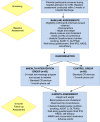Improving coronary heart disease self-management using mobile technologies (Text4Heart): a randomised controlled trial protocol
- PMID: 24588893
- PMCID: PMC4015816
- DOI: 10.1186/1745-6215-15-71
Improving coronary heart disease self-management using mobile technologies (Text4Heart): a randomised controlled trial protocol
Abstract
Background: Cardiac rehabilitation (CR) is a secondary prevention program that offers education and support to assist patients with coronary heart disease (CHD) make lifestyle changes. Despite the benefits of CR, attendance at centre-based sessions remains low. Mobile technology (mHealth) has potential to reach more patients by delivering CR directly to mobile phones, thus providing an alternative to centre-based CR. The aim of this trial is to evaluate if a mHealth comprehensive CR program can improve adherence to healthy lifestyle behaviours (for example, physically active, fruit and vegetable intake, not smoking, low alcohol consumption) over and above usual CR services in New Zealand adults diagnosed with CHD.
Methods/design: A two-arm, parallel, randomised controlled trial will be conducted at two Auckland hospitals in New Zealand. One hundred twenty participants will be randomised to receive a 24-week evidence- and theory-based personalised text message program and access to a supporting website in addition to usual CR care or usual CR care alone (control). The primary outcome is the proportion of participants adhering to healthy behaviours at 6 months, measured using a composite health behaviour score. Secondary outcomes include overall cardiovascular disease risk, body composition, illness perceptions, self-efficacy, hospital anxiety/depression and medication adherence.
Discussion: This study is one of the first to examine an mHealth-delivered comprehensive CR program. Strengths of the trial include quality research design and in-depth description of the intervention to aid replication. If effective, the trial has potential to augment standard CR practices and to be used as a model for other disease prevention or self-management programs.
Trial registry: Australian New Zealand Clinical Trials Registry: ACTRN12613000901707.
Figures

References
-
- Lloyd-Jones D, Adams RJ, Brown TM, Carnethon M, Dai S, De Simone G, Ferguson TB, Ford E, Furie K, Gillespie C, Go A, Greenlund K, Haase N, Hailpern S, Ho PM, Howard V, Kissela B, Kittner S, Lackland D, Lisabeth L, Marelli A, McDermott MM, Meigs J, Mozaffarian D, Mussolino M, Nichol G, Roger VL, Rosamond W, Sacco R, Sorlie P. et al.Heart disease and stroke statistics–2010 update: a report from the American Heart Association. Circulation. 2010;121:e46–e215. Published errata appear in Circulation 2010, 121:e260; Circulation 2011, 124:e425. - PubMed
-
- World Health Organization. Cardiovascular Diseases (CVDs) (Fact Sheet 317 (updated March 2013)). Available at http://www.who.int/mediacentre/factsheets/fs317/en/ (accessed 20 February 2014.
-
- Lawler PR, Filion KB, Eisenberg MJ. Efficacy of exercise-based cardiac rehabilitation post–myocardial infarction: a systematic review and meta-analysis of randomized controlled trials. Am Heart J. 2011;162:571-584.e2. - PubMed
Publication types
MeSH terms
Substances
Associated data
LinkOut - more resources
Full Text Sources
Other Literature Sources
Medical

